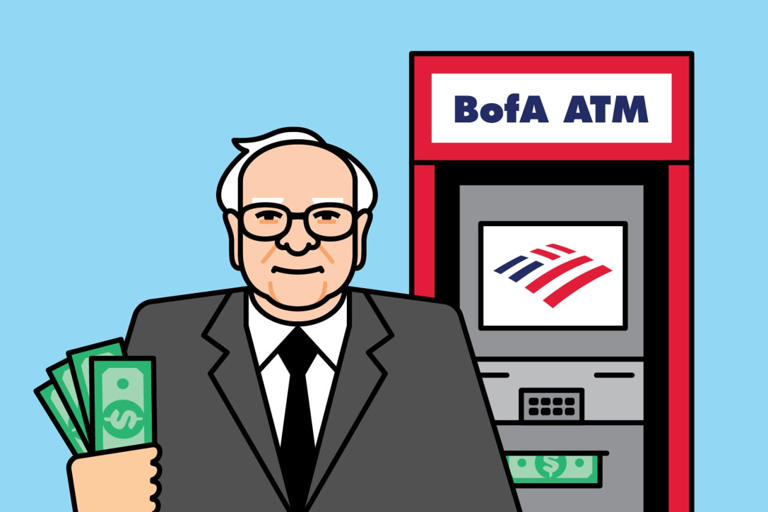Warren Buffett’s Berkshire Hathaway has recently made headlines by reducing its stake in Bank of America (BofA) by 5%, amounting to roughly $2.3 billion. This move marks the first time in at least four years that Berkshire has cut its holdings in BofA, prompting a range of speculations about Buffett’s investment strategy and its potential impact on the stock.
Berkshire Hathaway manages an extensive equity portfolio valued at around $400 billion, and Buffett’s decisions regarding large investments are closely watched by market participants. Historically, when Buffett has begun to divest from significant positions, such as with U.S. Bancorp, Wells Fargo, Goldman Sachs, JPMorgan Chase, Paramount Global, and HP Inc., it often indicates a broader strategic shift or a reassessment of the investment’s potential. The recent sale of BofA shares is seen as a critical move, especially given its significance in Berkshire’s portfolio.
Impact on Bank of America Stock
The reduction in Berkshire’s stake has had an immediate effect on BofA’s stock price. Over the past week, BofA shares have dropped by 2.87%, closing at $41.67. This decline is notable as it makes BofA the worst performer among its major banking peers during this period. The fear of additional sales by Berkshire could be contributing to the stock’s downward pressure, reflecting broader market concerns.
Despite the recent drop, BofA’s stock had recently hit a 52-week high of $44, and the shares are up approximately 25% year-to-date. Berkshire Hathaway’s average cost for its BofA shares is notably lower, at about $14 per share. This cost basis reflects a substantial gain for Berkshire, particularly considering that around 700 million of these shares were acquired through warrants on a $5 billion preferred-stock issue purchased from BofA over a decade ago, at an advantageous price of about $7 per share.
Potential Strategic Reasons Behind the Sale
The timing and scale of Berkshire’s sale suggest a few strategic considerations. One possible reason for Buffett’s decision could be a belief that BofA’s stock is now fully valued, prompting a strategic reduction. Additionally, reducing the stake below 10% could offer operational benefits, such as easing regulatory disclosure requirements. By cutting its holding to below this threshold, Berkshire could avoid the need to disclose stock purchases or sales within two business days, streamlining its portfolio management and reducing administrative overhead.
Buffett’s approach to managing Berkshire Hathaway’s investments often involves carefully timed decisions based on long-term value assessments. The sale of BofA shares might also reflect broader shifts in Berkshire’s investment focus or a reallocation of resources to other opportunities.
Broader Market Context
Berkshire Hathaway’s move occurs against a backdrop of significant market events and economic updates. The week saw notable political developments, including President Joe Biden’s decision to step out of the presidential race, with Vice President Kamala Harris gaining the necessary delegate support for the Democratic nomination. Traders also reassessed their positions regarding former President Donald Trump.
In the broader economic landscape, China implemented a cut in interest rates, and the U.S. economy showed mixed signals with a 2.8% growth rate in the second quarter. Inflation eased slightly, contributing to a rise in the Dow Jones Industrial Average, which gained 654 points on Friday. However, the S&P 500 and Nasdaq Composite Indexes faced declines of 0.83% and 2.1%, respectively, due to concerns over artificial intelligence investments and other market factors.
Upcoming Financial Events
Several key financial events are on the horizon that could further impact market dynamics. On Tuesday, July 30, more than 150 companies in the S&P 500 index will announce their earnings results. Notably, four of the Magnificent Seven—Microsoft, Meta Platforms, Amazon, and Apple—are scheduled to report their earnings this week. The results of these reports will be closely scrutinized for insights into the health of the tech sector and broader market trends.
Additionally, the Federal Open Market Committee (FOMC) will announce its monetary policy decision on Wednesday, July 31. The market expects the FOMC to maintain the federal-funds rate at 5.25%-5.50%, but investors will be keen to interpret Fed Chair Jerome Powell’s comments for indications of future rate cuts. This decision will be pivotal in shaping market expectations and economic forecasts.
Finally, on Friday, August 2, the Bureau of Labor Statistics will release the July jobs report. Economists anticipate an increase of approximately 177,500 nonfarm payrolls, with the unemployment rate expected to remain steady at 4.1%. This report will provide crucial data on labor market conditions and economic momentum.
Key Numbers
- $1,500: The estimated additional cost of a non-luxury electric vehicle (EV) compared to an internal combustion vehicle, up from $8,400 in 2023. This increase highlights the growing cost disparity between EVs and traditional cars.
- 53%: The rise in incentive packages for cars in June compared to the previous year. This increase is part of a broader trend, with car prices falling by 4% in the first half of the year.
- $427,000: The median U.S. house price in June, which set a record for the second consecutive month amid a slowdown in home sales. This high price level reflects ongoing trends in the housing market.
- $2,300: The average annual cost of full-coverage car insurance, which has risen 12% from 2023. This increase is attributed to a rise in the number of uninsured drivers and other factors affecting insurance costs.
Conclusion
Warren Buffett’s decision to trim Berkshire Hathaway’s stake in Bank of America underscores the complex nature of investment management and strategic decision-making. The reduction in holdings reflects a reassessment of BofA’s stock value and potential strategic adjustments by Berkshire. As the market navigates through political, economic, and corporate developments, investors will be watching closely to gauge the broader implications of such high-profile moves and their impact on market trends.
